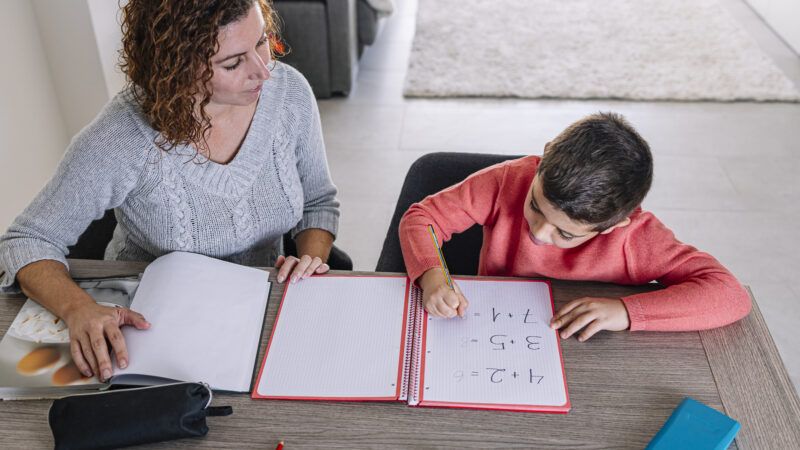Homeschooling Has Increased by Over 50 Percent Since 2018
In some states, homeschooling has climbed by over 100 percent.

Homeschooling has ballooned since the advent of the pandemic, growing by more than 100 percent in some states, according to new data from The Washington Post. While the number of children being homeschooled has declined slightly from its pandemic-era peak, the growth in the educational option has proven stable—and dramatic.
The Post collected data from 32 states, as well as the District of Columbia, and 7,000 school districts—a dataset comprising around two-thirds of the nation's schoolchildren.
Nationally, since the 2017-2018 school year, homeschooling has increased by 51 percent—while private schooling has only increased by 7 percent. Based on the available data, the Post estimated that there are now between 1.9 and 2.7 million homeschooled children in the United States.
But many states and districts saw truly staggering growth in their homeschooling population. Notably, many of these places had schools that were closed the longest during the pandemic. D.C. and New York both saw homeschooling increases of more than 100 percent, while California saw an increase of 78 percent. In Brooklyn, homeschooling in the borough's school districts saw increases that ranged from 197 percent to a whopping 492 percent (though the total number of homeschoolers remained under 1,000 students per district.)
This growth has helped transform homeschooling into a racially and ideologically diverse movement. According to data analyzed by the Post, homeschooled students were three-quarters white in 2019. By summer 2023, less than half were white. Homeschool parents are now roughly evenly split between conservatives and liberals, while those homeschooling before the pandemic overwhelmingly identified as Republicans.
Such a rapid growth in the number and diversity of homeschooling families indicates that more and more American parents are dissatisfied with their children's education in traditional public schools—and deciding to take matters into their own hands.
"Families who choose homeschooling less for ideological reasons and more for matters of circumstance and what meets the needs of their child in the present moment will help change our conception of what it means to be a home-schooler," Robert Kunzman, a professor at Indiana University's School of Education and director of the International Center for Home Education Research, told the Post.
However, not everyone is so excited about these changes.
"Policymakers should think, 'Wow — this is a lot of kids,'" Elizabeth Bartholet, an emeritus professor at Harvard Law School told the Post "We should worry about whether they're learning anything."
"I can tell you right now: Many of these parents don't have any understanding of education," added one school board member. "The price will be very big to us, and to society. But that won't show up for a few years."
While it's reasonable to want every child to get a solid education, fear of under-regulation in homeschooling makes a key faulty assumption: that children are somehow guaranteed to receive an education if they attend local public schools, or that low-performing public schools are held accountable for failing their pupils.
While allowing homeschooling carries a risk that some parents will educationally neglect their children, what often goes under-considered is that a shockingly high percentage of public schools are just as neglectful as subpar homeschool parents.
According to the National Assessment of Educational Progress Test, also called the Nation's Report Card, only 32 percent of fourth graders could read at a "proficient" or higher level. Thirty-nine percent landed in the lowest score category "below basic." In math, 35 percent of fourth graders scored proficient or higher.
The lows are even lower for some districts. At 23 Baltimore public schools, not a single student scored at grade level on a recent state math test. Forty percent of high schools in the city had no math-proficient students.
While data around the academic performance of homeschooled kids has obvious reliability issues, existing standardized testing data tends to show significantly higher performance among homeschooled students.
While all children deserve a comprehensive education, sending a child to public schools is hardly a guarantee this will happen. It's good news that more parents are taking their children's educational futures into their own hands, and public school advocates' fears about educational neglect are overblown and misdirected.


Show Comments (44)